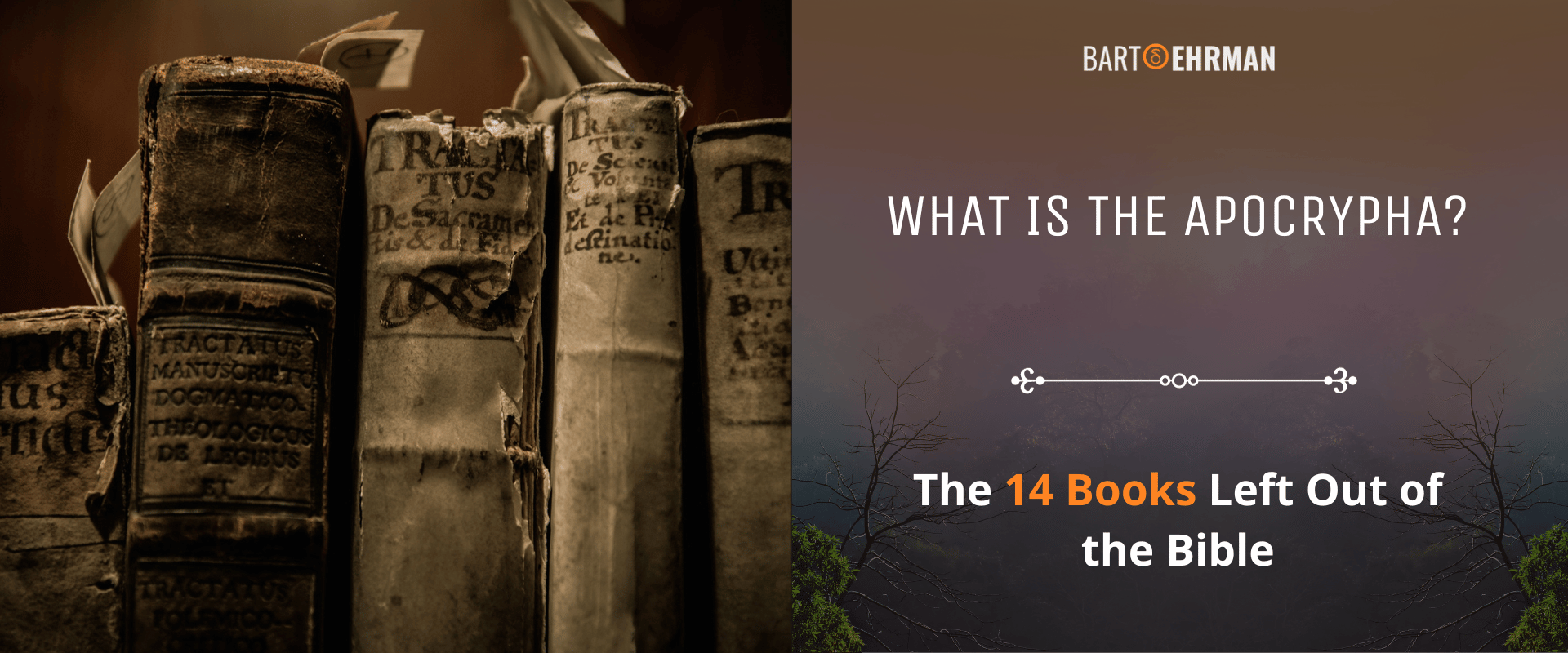What is the Apocrypha? The 14 Books Left Out of the Bible

Written by Joshua Schachterle, Ph.D
Author | Professor | Scholar
Author | Professor | BE Contributor
Verified! See our editorial guidelines
Verified! See our guidelines
Date written: October 30th, 2023
Disclaimer: The views and opinions expressed in this article belong to the author and do not necessarily match my own. - Dr. Bart D. Ehrman
The Apocrypha is a list of 14 books that were left out of the Hebrew Bible canon. In this article, I’ll identify the 14 books, describe them for you briefly, and tell you why they were left out of the Jewish canon.

What is the Meaning of Apocrypha?
The Greek word “apocrypha” simply means “hidden.” It only came to mean “books outside the biblical canon” during the Protestant Reformation many centuries after the books of the Apocrypha were written.
Martin Goodman notes that this term was never used in antiquity to designate a group of separate books outside the canon. However, it was sometimes used in the ancient world to refer to books that had secret or enigmatic teachings. Some early Christians also used the term to refer to books they considered inauthentic or heretical.
When were the Books of the Apocrypha Written?
The Apocrypha, while often referred to as a single entity, actually consists of a diverse set of books written over a long period of time. In fact, the books were written roughly between 400 and 200 BCE. It’s possible that some people thought that books written so recently couldn’t be holy Scripture.
The period of history when the books were written has also sometimes been considered problematic. The Hellenistic period went from the death of Alexander the Great up to just before the 1st century CE (323 BCE– 32 BCE). This was a time when Jews, both in Palestine and the diaspora, absorbed a lot of Greek language and culture.
Part of the result of this was that many Jews were writing new religious texts in Greek rather than Hebrew (remember that the entire New Testament, for example, was written in Greek). Some Jews may have seen these writings as being less authentic than books written in Hebrew.
Did the New Testament Authors know the Apocrypha?
The Apocrypha is intimately tied to the Septuagint, the Greek translation of the Hebrew Bible. All the writers of the New Testament referred to the Septuagint for their quotations. For this reason, the Septuagint was mostly transmitted to the world through Christian writers’ references rather than Jewish scribes who were mostly writing in Hebrew.
Although Goodman writes that no New Testament author quotes directly from the Apocrypha, many New Testament authors refer to expressions and images from the Apocrypha. Scholars don’t know for sure whether those authors were reading Apocryphal books or whether the stories they referred to were already part of Jewish culture in the 1st century.
For example, both Paul and the anonymous book of Hebrews use imagery that is very similar to that in an Apocryphal book called the Wisdom of Solomon. Likewise, Hebrews 11:35-37 mentions the martyrdom story from another book called 2 Maccabees.
All this indicates that for some Christians in the 1st century, these books might have been considered canonical.
Did Early Church Fathers Know the Apocrypha?
While the New Testament authors may have made references to the books of the Apocrypha, several early Church Fathers actually quoted directly from them. The late-1st-century document called 1 Clement quotes from the Wisdom of Solomon. The Epistle of Barnabas, another early Christian document, quotes from several other books, and an early Church father named Polycarp referred indisputably to a story from apocryphal additions to the book of Daniel.
This shows that many in the early Church accepted the apocryphal books as Scripture.
This may be why Catholic Bibles have given the Apocrypha a section all its own. In fact, seven Apocryphal books (Tobit, Judith, 1 and 2 Maccabees, Wisdom of Solomon, Sirach or Ecclesiasticus, and Baruch), are considered as equally divinely inspired as any other part of the Catholic Bible. We will review these Apocryphal books and others below.
Aside from the Catholic Bible, however, other forms of the Christian Bible do not include the Apocrypha.
Jewish Views on the Books of the Apocrypha
It’s not entirely clear when the Hebrew Bible canon became solidified. Goodman says that it’s highly likely that the writings of the Apocrypha were initially taken by many Jews as inspired Scripture.
However, early rabbinic writings only refer to one book – Sirach – and seem wholly unaware of all the others. As I said earlier, this may be because the apocryphal books were only available in Greek, although several books had been translated to Greek from Aramaic and/or Hebrew. On the other hand, there is evidence that rabbinic writers may have viewed apocryphal books as contradicting some of the principles from the rest of the Hebrew Bible.

The Books, Dates of Composition, and Summaries
Tobit, written 225-175 BCE
This book tells the story of two Israelite people, a blind man named Tobit living in Nineveh and a woman named Sarah, living in a city called Ecbatana. Tobit sends his son Tobias to retrieve some money he’d left in another city. An angel named Raphael guides Tobias to Ecbatana, where he meets Sarah. Raphael saves Sarah from a demon and Tobias marries Sarah. They return to Tobit who has been miraculously cured of his blindness.
Judith, written about 100 BCE
Judith, a Jewish widow, attracts and seduces an Assyrian general besieging her city. Having ingratiated herself with him, she waits until he is drunk and then decapitates him, saving the capital Jerusalem from total destruction.
Esther, written around 115 BCE
Although the Hebrew version of Esther is canonical, the Greek translation adds six sections to it. Esther is the story of an Israelite woman who saves her people from an anti-Israelite Persian plot. The canonical story makes no mention of God. The additions, however, mention God more than 50 times and also speak of the inner thoughts of the main characters.
Wisdom of Solomon, written around 50 BCE
This book centers on the importance of Wisdom as related to humans and to God. It may have influenced the famous prologue of the Gospel of John, with wisdom replaced by the “Word.”
The Book of Sirach or Ecclesiasticus, written 200-175 CE
This is the only book of the Apocrypha for whom we know the author, Jesus son of Sirach. We know this because his grandson, Ben Sira of Jerusalem, translated the original Hebrew document into Greek and wrote a prologue. The book is entirely based on ethical teachings.
Baruch, written 200-100 BCE
Baruch consists of contemplations by a Jewish writer about past Jewish exiles from Babylon. It includes theology and thoughts on wisdom.
The Prayer of Azariah and Song of the Three Holy Children, written 1st century BCE
These are Greek additions to the Hebrew/Aramaic book of Daniel. The first part is the prayer of Daniel's friend Azariah (called Abednego in in Daniel 1:6–7) while he, Shadrach and Meshach are in the fiery furnace. The second part talks about the angelic figure in the furnace with them. The third part is a hymn of praise to God for saving them.
Story of Susanna, written 333-160 BCE
Another Greek addition to the book of Daniel. A married woman named Susanna is seen bathing by two elders. In their lust, they go to her and demand that she have sex with them. She refuses and they have her arrested, falsely claiming that she had sexual relations with a young man.
As she is about to be executed, the prophet Daniel interrupts, demanding that her accusers be questioned. The men’s deceit is exposed and they are executed instead.
The Story of Bel and the Dragon, written 200-100 BCE
These are also Greek additions to the Book of Daniel. In it, the king of Babylon insists that his Bel, a Babylonian god represented by an idol, is really a god, since he eats and drinks the food offered to him every day. Daniel disagrees and discovers that the priests of Bel are eating and drinking the offerings.
In the story of the dragon, there is an actual animal called a dragon which the king claims must be a god. Daniel promises to kill it without a sword, and does so by giving the dragon poisonous food, thereby proving the dragon is not a god.
The Prayer of Manasseh, written 1st or 2nd century BCE
A brief prayer ascribed to Manasseh, one of the kings of Judah. In the Hebrew Bible, this king worships idols and then is taken prisoner by the king of Assyria. In captivity he prays for mercy – this prayer is supposedly his actual prayer – and when he is freed, he stops worshiping idols.
1 Maccabees, written about 100 BCE
This is the story of the Maccabean Revolt against the Seleucid Empire, whose King Antiochus IV Epiphanes issues decrees demanding that Jews forget Jewish culture and accept Greek language and culture.
2 Maccabees, written 150-100 BCE
More stories of the Maccabean Revolt against King Antiochus IV Epiphanes. It ends with the defeat of the Seleucid Empire by Judas Maccabeus, the leader of the Maccabees.
1 Esdras, written 2nd century BCE
Septuagint translation of the Hebrew Book of Ezra. Very similar to the Hebrew version of Ezra–Nehemiah, although stories of Nehemiah are removed, and some material is added.
2 Esdras, written 70-218 CE
One of many apocalyptic Jewish books written in the 1st to the 3rd centuries CE. The author claims to be (but cannot be) Ezra, a scribe and priest of the fifth century BC.
Conclusion: The Apocrypha
What is the Apocrypha? The Apocrypha consists of 14 books that were ultimately excluded from the biblical canon.
Why were these books left out of (most) Bibles? There are many reasons. Their late date of composition may have made them seem too recent to be considered Scripture. In addition, the fact that they were in Greek may have alienated some Jewish thinkers who may also have found some content that conflicted with earlier Jewish teachings.
Do Christians accept the Apocrypha? Most Christian Bibles leave out the Apocrypha. Catholic Bibles, however, give them their own section. While Catholics encourage people to read these books, they emphasize that they are not divinely inspired Scripture.
FREE COURSE!
WHY I AM NOT A CHRISTIAN
Raw, honest, and enlightening. Bart's story of why he deconverted from the Christian faith.
Over 6,000 enrolled!
